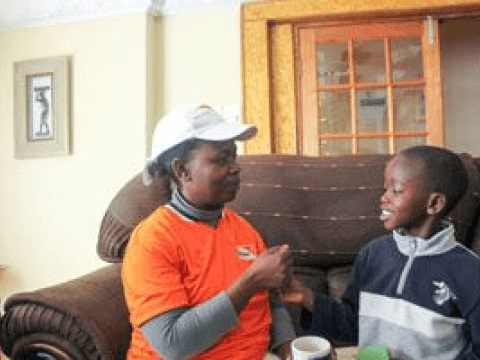Arguing about food while others struggle

It is Friday morning and I’m at the kitchen table with my nine-year-old son. I have just cooked fried eggs and set them in front of him.
He pushes the plate away.
“I don’t like fried eggs. I always tell you mom, I would rather eat a boiled egg,” he says.
I start to boil inside. There’s no time to make hard boiled eggs, I have to leave for work in a few minutes. What’s more, he’s complaining about food when so many others go to school on an empty stomach.
I immediately think back to Lineo, a girl I had met the day before while on assignment for World Vision.
Lineo is an orphan and the oldest girl in her house. When I first met her, Lineo had just returned from a two-day walk to a local clinic where she had carried her youngest sister. Lineo’s feet were swollen from walking barefooted for the whole day.
She was hungry when she arrived at her home and opened a pot that some of her other siblings often cooked in. It was empty. A second pot had a few leftovers from the meal the day before.
While Lineo was hungry, and felt like eating everything that remained, she waited. Her two younger sisters, Thato, 7, and Mpho, 3, also needed to eat and would return home from school shortly.
Thato arrived first. Her feet were also swollen too from walking barefooted to and from school. When Mpho returned from a nearby pre-school, where World Vision is helping pay for her school fees, the three children, and the baby, shared the few scraps of food.
As I watched them eat, I reflected on my own two children, my 16-year-old daughter in Grade 11 and my nine-year-old son who is currently in Grade 4.
I thought of how lucky I am. My children at least have enough to eat every day.
I try to impart these lessons with my children. Whenever I return from the field, I tell Thembane, my son, about the children I meet. I tell him how they struggle to have adequate clothing, food or shelter. From the stories, I hope that they understand how lucky they are to have what they have. And I want them to understand is the importance of sharing what they have been blessed with.
Meanwhile, back at Lineo’s house, I say a small prayer of thanks. The children, even though they don’t have parents, do have a two-roomed house that World Vision was able to build, thanks to donor support.
The food that they eat, and ration, is provided from a food package that World Vision gives the family each month. Still, I am left praying that something more can be done for this family.
In the two years that I’ve worked for World Vision, I’ve learned to pray both my own children, asking God to guide them to be their best and for them to be what they are meant to be. I also pray for other people’s children, with the same request.
On that Friday morning, at my kitchen table, I try to remain calm. I wish my son could see how other children are struggling. I wish he was more grateful for he has.
But instead, I get up, and get some bread. I offer it to him. You are so lucky, I think to myself, hoping there will be no more complaints about food in the future.
About the author: Makopano Semakale is a communication officer for World Vision Lesotho. She has also worked for Lesotho’s Ministry of Education as a teacher and, later, as a communication officer in the past.
